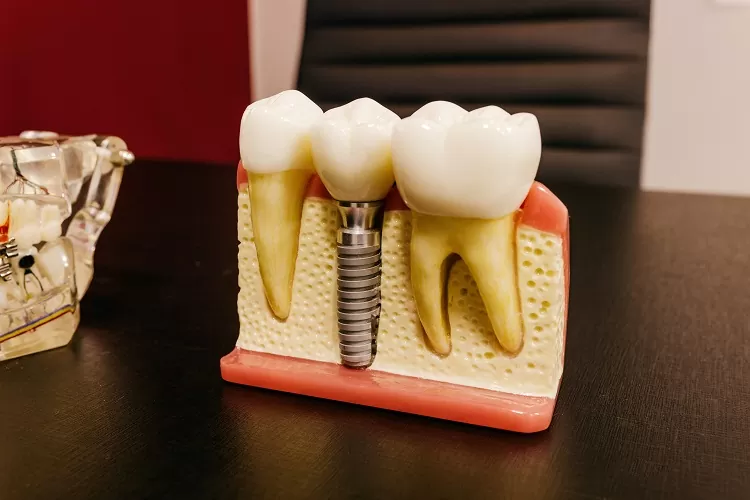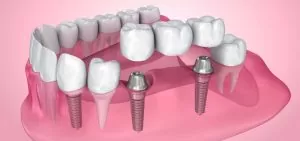Dental implants are metallic dental devices and can also be used to support artificial teeth and other dental structures such as crowns, veneers, etc.
If due to any reason you suffer from tooth loss, you may find yourself experiencing some side effects like pain in the gums, chewing and speaking problems, bone loss, etc. Dental implants can be used to fix these issues and restore the ability to chew and eat food properly. Also help in teeth realignment.
Before beginning the dental implant procedure, the dentist may advise the patient to get an X-ray scan of the teeth for a thorough examination of the condition of teeth. Then, if the damaged tooth has not fallen off on its own, it is removed with the help of forceps and a little local anaesthesia. After tooth removal, the gum is prepared for implant placement. It is usually grafted with the help of additional tissue from the mouth roof or any other region of the mouth with extra gum tissue. After this tissue heals, an incision is made for fitting the metal posts for the implants. This arrangement is left untouched for a few weeks so the jaw bone can grow around it. An abutment is placed over this region and then it is topped with a crown for natural appearance and protection of the abutment.
Implant placement can also fail causing it to fall off. Let us understand factors affecting implant failure and what to do if it happens.
Poor oral hygiene
Maintaining good oral health and hygiene is the first step toward effective dental treatments and long-lasting results. If the patient fails to maintain good oral health, implant failure becomes highly probable. Unhygienic conditions of the mouth can cause gum recession, causing a loss of grip on implants, damage or loss of the jaw bone tissue, and shifting of the implant.
To avoid such conditions, the patient should maintain good oral health right after the completion of the dental implant procedure. Brushing teeth with fluoridated toothpaste and flossing twice a day is also highly recommended by specialists and dentists alike. Dental floss can reach confined spaces of the teeth like the fine gaps between teeth and can effectively maintain good oral health. Using a good antibacterial mouthwash is also recommended to maintain the overall health of the mouth.
Dental and oral diseases
Usually, the patients are checked for any pre-existing dental diseases before beginning the dental implant procedure. If any dental disease like periodontal disease goes unchecked and the dentist proceeds with the treatment, it may lead to a failure of dental implants. As diseases like periodontitis can affect the gum tissue, the grip on the dental implants may be affected and the implant may fall off completely.
Improper placement of the implant
When an implant is improperly placed in the jaw bone tissue, it can lead to dental implant failure. If too few metal posts are fixed the implants may not be able to stand firm in their place. Also, if the metal posts are too loose, the bone tissue may not be able to completely integrate around it and the implant may fall off.
Consumption of toxic products
Consuming toxic and harmful products can equally affect dental treatments just as it affects overall health. Tobacco, alcohol, and smoking cigarettes can affect teeth and can cause serious diseases which affect the gum and jaw bone tissue which can affect the dental implant process. The patient should stop consuming such products a few months before the dental treatment for successful results and overall health.
Symptoms of implant failure
If the dental implant has failed and it is not effective anymore, certain symptoms are observed that can indicate it is time to reach out to a dental professional.
The patients should look out for these symptoms:
- Swollen gum and jaw bone tissue
- Shifting and loosening implant
- Pain on implant site
- Difficulty in chewing and swallowing
- Gum recession and bleeding
These symptoms may occur right after the treatment or after a few months when the teeth and gums have completely healed from the treatment. Either way, just after the patient observes signs of failure, he should reach out to his dentist as soon as possible.
What to do if implant fails?
If due to any of the above-specified reasons or any other causes, the dental implant fails, then the patient must immediately contact their dentist. The patient should accurately explain the condition and confirm whether the implant has failed or if it is just a minor issue that can be resolved. If the patient can detect the cause of the failure, he should explain it to the dentist as treatment of dental implant failure largely depends on the cause.
Thorough cleaning
If the implant has failed due to an infection or microbial growth, the patient should thoroughly clean the area and maintain hygiene until reaching the dentist’s office for receiving official treatment, i.e. removal of the implant. The earlier the symptoms are detected, the symptoms are detected the easier and more effective the treatment becomes. Early detection also prevents the conditions from becoming severe.
Bone grafting
Dental implants cannot stay stable in their position if there is a loss in jaw bone tissue. If there is damage to the implant due to an injury or trauma, the patient will be recommended a bone grafting treatment to improve the situation. A stronger and denser piece of bone tissue is incised from another location in the mouth and is stitched onto the site of dent implantation. This treatment option includes temporary removal of the implant so the implantation site can heal and there is no irritation.
Implant removal
In severe cases of dental implant failure, removal is recommended by dentists. There are two ways an implant is removed by a professional. The trough bur method and removal with an adapter. In the trough bur method, a little piece of the bone tissue containing the implant is incised. Whereas, implant removal with the help of an adapter is done by removing the implant without incision. After removal of the implant, the dentist may suggest replacement with a new implant.




